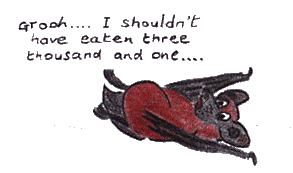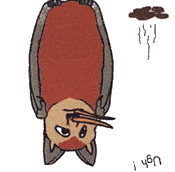 |
Bats don't chew electrical cables, food
or people for that matter! In fact, they don't do much chewing
of anything other than their own food, which they are very adept
at collecting for themselves. They don't need to tunnel out a
nesting place. They simply tuck in to the gaps between timbers
or under tiles or slates. Some may be seen in attics but most
live above attics or in the fascia board surrounding the eaves
of a house.
Bats aren't mice (or rats) and don't have such "baby booms"
- they have one baby each year in summer. Bats belong to an order
of mammals (the only flying ones - Chiroptera) that dates back
over 50 million years.
|
 |
|
 |
Irelands bats are incurable insect-eaters!
Try as you might, you won't succeed in changing their diet to
blood or anything else. They insist on eating thousands of midges,
mosquitoes, moths and other small bugs. They even play a major
role in keeping down the numbers of insect pests which could destroy
our crops.
Bats are not blind! Hence, they will not get caught in your hair
- they will just lodge in your attic! They navigate at night using
a "sonar" which is mostly above our hearing range. This
"ultrasound" is what allows them to see in complete
darkness! Now who is the blind one? They have been setting speed
traps for insects for millions of years before the Police thought
of it.
|
 |








